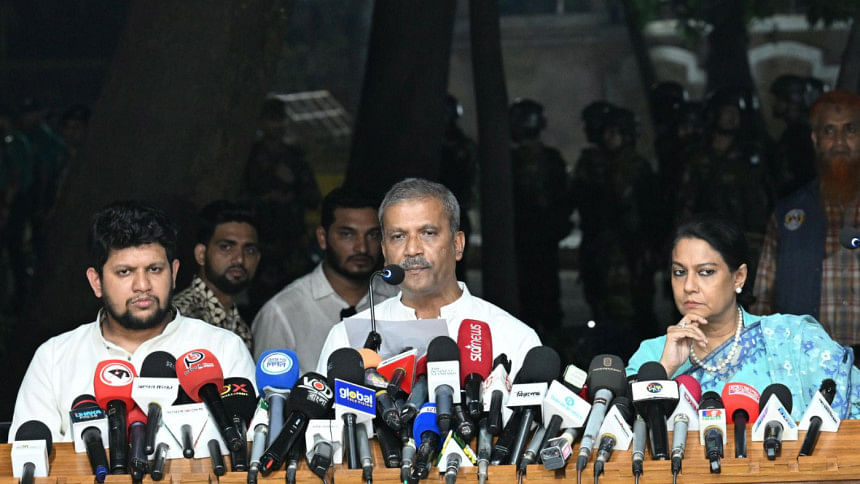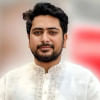Govt decides to ban AL activities

The interim government has decided to ban all activities of the Awami League, including in cyberspace, under the Anti-Terrorism Act until the International Crimes Tribunal completes the trial of the party and its leaders.
Protesters at Shahbagh and in front of InterContinental burst into joy as the decision of the council of advisers, led by Chief Adviser Prof Muhammad Yunus, was made public in a press briefing last night.
The decision was made at a special meeting of the council following three days of demonstrations demanding a ban on the party and its trial for atrocities to suppress the July uprising.
The ban aims to "ensure national security, protect leaders and activists of the uprising, and safeguard plaintiffs and witnesses involved in the tribunal proceedings", Law Adviser Asif Nazrul said at the briefing held in front of the chief adviser's official residence.
A circular regarding the ban would be issued on the next working day, he said.
The Awami League was formed in 1949.
The advisers also approved an amendment to the International Crimes (Tribunals) Act, 1973, giving the tribunal the authority to punish political parties, their affiliated organisations, or support groups.
Additionally, the council decided to publish the July declaration within the next 30 working days.
Nazrul only read out the decisions and did not take any questions.
During the uprising rooted in the anti-discrimination student movement last year, hundreds of people, including women and children, were killed in police firing or attacks by Awami League cadres.
A United Nations Fact Finding Mission by the Office of the United Nations High Commissioner for Human Rights estimates that as many as 1,400 have been killed.
In a report in February, the mission said "serious human rights violations and abuses" committed by the security forces and armed Awami League supporters between July 15 and August 5, 2024, stemmed from a calculated effort to retain power at all costs.
Ousted prime minister and Awami League chief Sheikh Hasina fled to India on August 5. Most of the party's top leaders are either hiding abroad or are in jail.
NCP Convener Nahid Islam in a Facebook post demanded implementation of all the decisions of the advisory council as soon possible.
"The fascist murderers across the country must be identified and swiftly brought to justice. The Election Commission must quickly revoke the registration of the banned fascist Awami League," he said.
The demonstrations began outside the chief adviser's residence late on Thursday night after Hasnat Abdullah, chief organiser (south) of the NCP, urged his followers on Facebook to gather there to press home their demand for banning AL.
They moved to Shahbagh, blocking the intersection, on Friday afternoon.
Yesterday, they vowed not to leave the streets until their demand was met. The protests spread to other parts of the city and the country.
The protesters then marched to the InterContinental intersection when the advisory council meeting was underway. They also threatened to isolate Dhaka from the rest of the country.
After the government announced its decision to ban the AL, leaders and activists of different political and student organisations, including the NCP, Jamaat-e-Islami, and Islami Andolan Bangladesh, brought out victory processions.
The protesters, divided into small groups, marched back to Shahbagh from the InterContinental intersection. They were chanting different anti-AL slogans.
However, none of the protest leaders commented on their next course of action until the filing of this report.
In a Facebook post, Hasnat urged the protesters not to leave the streets until the leaders formally announce their stance on the government's decision.
In late October, the government banned the AL's student wing, Bangladesh Chhatra League, under the Anti-Terrorism Act-2009, amid demands from the student movement against discrimination.
The same month, the government reconstituted the International Crimes Tribunal by appointing its chairman and two members to start the trials of people who committed crimes against humanity during the uprising.
A second International Crimes Tribunal was formed on Thursday to expedite the trials and address the increasing number of cases filed.
Currently, 22 cases are pending with the ICT, and 339 complaints have already been filed with the ICT investigation agency over the July atrocities.
The ICT was originally formed in March 2010 by the Awami League government to try the perpetrators of the crimes committed during the Liberation War in 1971.
The interim government in its first draft for the amendment to the International Crimes (Tribunals) Act 1973 included a provision to allow the trial of organisations.
Information Adviser Mahfuj Alam on Thursday wrote on Facebook that the government was going to incorporate a new provision into the law to try the Awami League as a party.

 For all latest news, follow The Daily Star's Google News channel.
For all latest news, follow The Daily Star's Google News channel. 





Comments